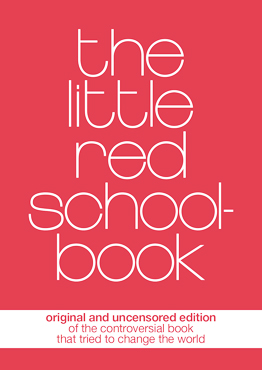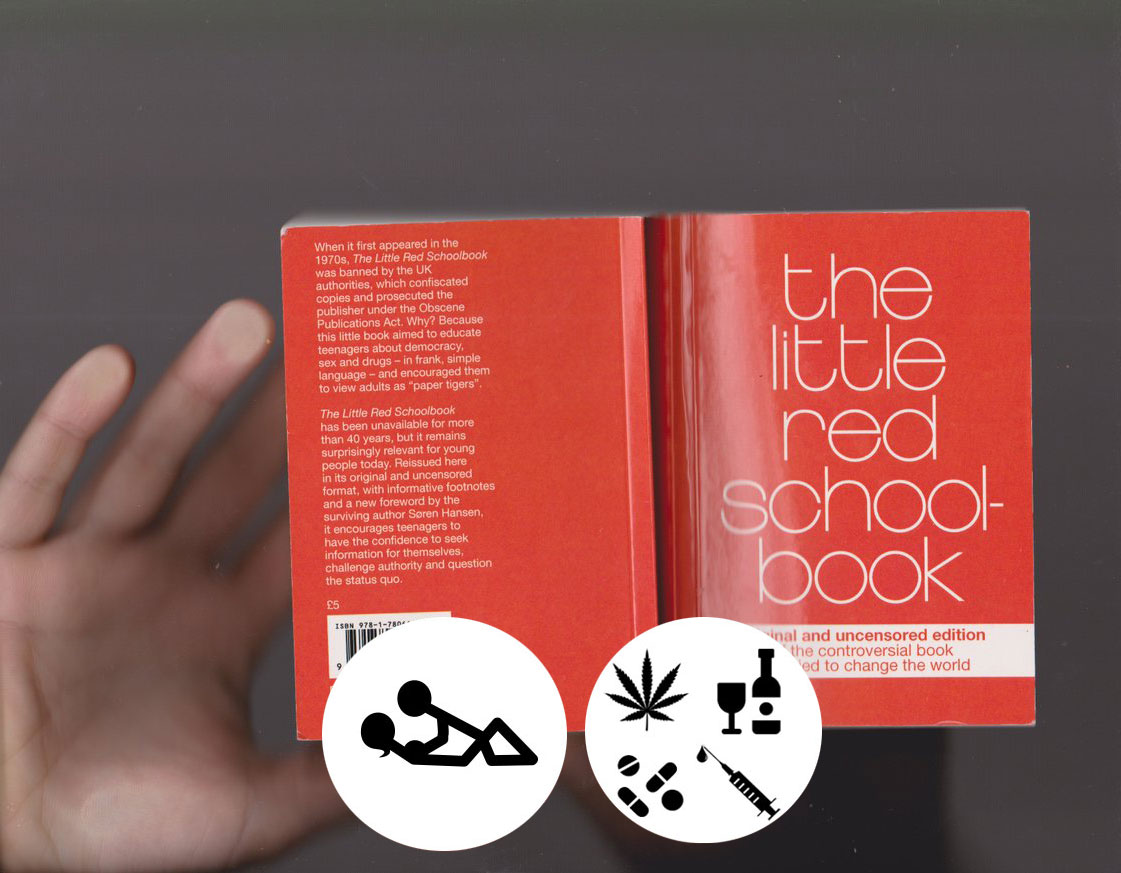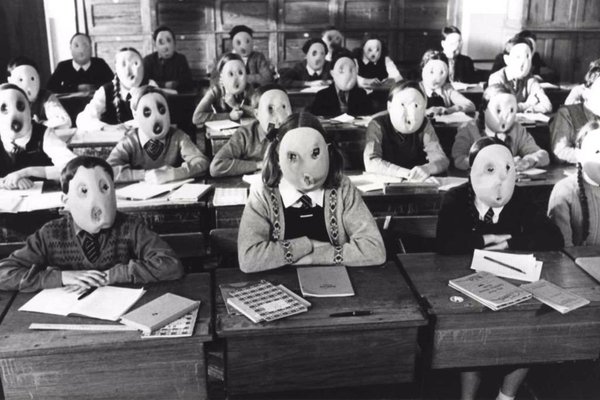This is the second article of two on the controversial book. It covers the passages on sex and drugs. The first article features the controversial pedagogical passages.
Half a century ago a book, which has long been forgotten, was accused of promoting sex and drugs to children (age 10 to 17). The Little Red Schoolbook embraced homosexuality at a time when it was still considered an immoral activity in most Western societies, albeit it was increasingly being decriminalized. It also encouraged its underage readers to enjoy sexual relations and pornography. Masturbation, on which the mainstream advice was “stop or you’ll go blind” among other warnings, was signaled out as a safe and pleasurable activity for both genders.
Today’s curious readers will find some of it sensible, ahead of its time and none of it is surprising since much of the advice is a standard part of contemporary sex education for teenagers. However some passages could definitely still raise eyebrows like the one on pedophilia, where the writers describe child molesters as just lonely men who’ve got no one to sleep with. Elsewhere it casually lists pornography featuring sex with animals or violence as harmless as any other kind.
Note: The Little Red Schoolbook was first published in Denmark in 1969, then it was translated and published with information specific to countries such as Britain, Finland, Germany, Italy, Norway, Spain, Sweden and USA. The excerpts below are from the New Zealand edition.
Be yourself
…
Maybe you smoke pot or go to bed with your boyfriend or girlfriend—and don’t tell your parents or teachers, either because you don’t dare to or just because you want to keep it secret.Don’t feel ashamed or guilty about doing things you really want to do and think are right just because your parents or teachers might disapprove. A lot of these things will be more important to you later in life than the things that are “approved of”.1Jesper Jensen and Soren Hansen, The Little Red Schoolbook: New Zealand edition, trans. Berit Thornberry (Copenhangen: Hans Reitzels Forlag A/S, 1969; revised and republished, Wellington, New Zealand: Alister Taylor, 1972), 76.
One paragraph in particular was the center of the obscenity controversy for its use of four-letter words which decades later no mainstream newspaper would print:
The usual word for a boy’s sexual organ is cock or prick. The usual word for a girl’s sexual organ is fanny or cunt. Many adults don’t like these words because they say they’re “rude”. They prefer words like penis or vagina.2Ibid, 94.
On masturbation:
When boys get sexually excited, their prick goes stiff…If a boy rubs his stiff prick it starts feeling good and this leads to what is called orgasm. This is called masturbation or wanking. Girls masturbate by rubbing their clitoris[…], and this may lead to an orgasm too.
…
Some do it several times a day, some several times a week, some more rarely. Adults do it too. If anybody tells you it’s harmful to masturbate, they’re lying. If anybody tells you you mustn’t do it too much, they’re lying too, because you can’t do it too much. Ask them how often you ought to do it. They’ll usually shut up then.3Ibid, 94.
On menstruation:
When girls are old enough they start having period or menstruating. Blood comes out of their vagina, roughly once a month. Some girls start having periods (sometimes referred to as “the curse”) when they are quite young. Others start menstruating later. Both are completely normal.4Ibid, 103.
On intercourse:
When a boy puts his stiff prick into a girl’s vagina and moves it around this is called having intercourse or making love or sleeping together (even if they don’t sleep at all). The usual word for intercourse is fucking.
A boy and girl can “make love” and give each other pleasure without necessarily fucking. If you don’t want to fuck, perhaps because you’re afraid of having children, you can find lots of other ways of giving and having pleasure—for instance by kissing, cuddling, petting or masturbating each other. 5Ibid, 96-97.
On losing virginity:
When girls haven’t had intercourse before there’s usually a thin film of skin at the opening to their vagina. It’s called the hymen or maidenhead. This has to be removed before a diaphragm can be put in. This can happen during intercourse, or the doctor can remove it, or you can break it yourself by using a couple of clean fingers. It may bleed a little, but it hardly ever hurts if it’s done gently.6Ibid, 100.
On contraceptives:
If a boy and girl fuck, they may have children. To avoid this, contraceptives are used. Boys use durex, which are sometimes called french letters or frenchies. These are covers made of thin rubber which are rolled over the prick when it is stiff. You can get them at a chemist or you can write for them from shops that advertise ‘personal supplies’ in papers and magazines. Only buy the best quality—they should always be electronically tested.
Girls use a diaphragm (or Dutch cap), the loop or the pill. You must have a prescription from a doctor to get the pill. The doctor will need information about your menstrual cycle; but if he starts asking questions which are none of his business or starts preaching morals, go to another doctor. Female doctors are often more sympathetic.7Ibid, 96-97.
If your own doctor is unsympathetic you can do one of several things. Firstly, you could change your doctor, but if you are living at home yuou could probably prefer to remain registered with the same doctor as the rest of the family. Secondly, you can telephone other doctors to ask their attitude to contraception for unmarried girls, and when you find a friendly one ask him or her to take you as a private patient, for contraception only. There will be a fee, and although it is preferable that he informs your own family doctor, it is not essential, medically or legally, if you ask him not to. Remember, the doctor has no right to tell your parents or anybody else unless you’re under 16, the age of consent.8Ibid, 98.
There ought to be one or several contraceptive vending machines in every school. If your school refuses to install one, get together with some friends and start your own contraceptive shop.9Ibid, 102.
On pornography:
Pornographic pictures are usually of people in the nude (mostly girls), having intercourse or caressing each other. But there are other kinds—for example pictures of intercourse with animals or pictures of people hurting each other in various ways. Pornographic stories describe the same sort of thing.
In New Zealand the Indecent Publication Tribunal (bold font in original) bans or limits hard-core pornography. But in some countries, like Denmark, there are no restrictions.
Sexual appetites vary a lot. Some people want to see pictures or read about things that they would never actually do themselves. But it’s possible that some desires which may be harmful to other people may be satisfied harmlessly through pornography.
Anyway it’s a fact that the amount of “criminal indecency” in Denmark has dropped sharply since pornography became legal there.
Almost all pornography gives a false idea of reality. It describes men who are able to make love for hours on end and have several orgasms within a short period. There are also stories about girls who want to make love all the time and in all kids of different ways.
Porn is harmless pleasure if it isn’t taken seriously and believed to be real life. Anybody who mistakes it for reality will be greatly disappointed.10Ibid, 105.
On homosexuality:
Some people are only attracted towards the opposite sex; some are attracted towards their own sex; some are attracted towards both sexes. People attracted to both sexes are called bi-sexual. People attracted to their own sex are called homosexual or queer or gay. At least 10 percent (ie one in 10) of the male population has homosexual tendencies. For women the percentage may be a bit lower.
In purely physical terms, homosexuals make love just like anybody else, although of course they can’t have intercourse in quite the same way. Their love and their feelings are just as real and genuine and natural as anybody else’s.
Many of them have great difficulties because in our Christian culture they are considered sick, abnormal or even criminal. In many other cultures homosexuality is recognized just like other forms of sexuality.11Ibid, 107.
Then comes a remarkably early prediction regarding gay marriage which would become legal in New Zealand four decades later, in 2013:
Homosexuality between males is still illegal in New Zealand because of very outdated laws and ill informed public opinion which persecutes homosexuals. Female homosexuality, which is called lesbianism, has never (bold font in original) been illegal in New Zealand. Many homosexuals live together in stable relationships, and probably the time will come when homosexual marriages are recognized.
…
Overseas the Gay Liberation Front (bold fond in original) is a new and very militant organisation which campaigns for an end to every sort of discrimination against homosexuals and bi-seuxals. Unfortunately, a young person who suspects that he or she is homosexual has no one to turn to. However, your doctor may be able to help.12Ibid, 107-108.
No advice from the sixties counterculture is complete without a positive comment on “free love”:
There are many other forms of family life apart from marriage between one man and one woman. People can have group marriages or live together in a group as a commune. But in law our society still only recognises one kind of family–marriage between one man and one woman.13Ibid, 108.
On sexually transmitted diseases, a decade before the global pandemic of HIV:
VD [venereal disease] is irritating and it can be serious if it is left untreated but it can be cured. More than half the people treated in New Zealand hospitals for VD are under twenty years of age and although VD is on the increase the serious cases (ones that have been left without treatment) are on the decline.14Ibid, 111.
There are two main types of venereal disease. There is gonorrhea or the ‘clap’ which girls are unlikely to notice since it normally develops painlessly around the womb entrance.[…]
Fortunately the symptoms of the clap in boys are unmistakable. You get a burning sensation when you pee followed by a discharge of yellow pus oozing from your prick.
…
Syphilis is a far more serious form of venereal disease but fortunately it is less common.
…
Boys can avoid catching most venereal infections by wearing a french letter during intercourse.15Ibid, 112-114.
On abortion:
If you decide it’s better not to have the baby, you might be able to get the pregnancy stopped. This is called abortion. Abortion is a minor operation: it can be uncomfortable, but it’s not very dangerous if performed in time by properly qualified people. There are two kinds of abortion, legal and illegal.
Unfortunately legal abortions are only given in New Zealand in extreme medical situations and so most abortions undertaken in this country are illegal–often backyard or amateur operations. These are extremely dangerous. Many New Zealand girls used to arranged through their doctor or lawyer to go to Australia where a sophisticated and reasonably safe system of underground aboritionists was working. Following police investigations and prosecutions it is now difficlt to make contact with the doctors concerned.
It will be a long time before the laws are changed in New Zealand to allow abortions on demand.
…
Many girls get so desperate that they try to bring on the abortion themselves. There are many old wives tales about how it can be done. Don’t believe in them. Don’t try it. You may kill yourself.16Ibid, 115-118.
The book includes a sympathetic view of child molesters:
Child-molesters or “dirty old men”
In the old days people used to talk about “dirty old men”. Children were told they were dangerous. This is very rarely true.They’re just men who have nobody to sleep with.
There are often stories in the papers about them. They’re often called exhibitionists or child-molesters. If it says in the paper that a men “behaved indecently”, it means he opened his trousers and showed someone his prick. If it says he behaved with “gross indecency”, it means he masturbated or got the child to touch his prick. He may have touched the child’s sexual organs too. Sometimes these incidents are followed by rape (forced intercourse), or violence or murder. The latter is very rare, and it’s usually because the man got scared. If you see or meet a man like this, don’t panic. Go and tell your teachers or your parents about it.17Ibid, 104.
On “being high”:
The effects may vary according to the mood you’re in beforehand. They also vary from person to person. It’s rare for anyone to become violent–which often happens when people get drunk. But with big doses it is possible to lose your self-control completely and act violently. With smaller doses, the most common effect is either that you become more withdrawn and introspective, or that you become friendly and happy and even giggly. You often get a dry mouth too, and want a drink–though hardly ever alcohol. Sexual feelings may either increase or decrease. Unlike alcohol, pot doesn’t give you a hangover.18Ibid, 135.
Being high can be fun. But don’t count on working or learning anything while the sensation lasts.19Ibid, 141.
On whether pot is “habit-forming”:
Pot is certainly socially habit-forming, rather like alcohol or tobacco. People often smoke it for the first time when it’s handed round at a party, and then go on smoking it whenever they’re in similar surroundings. If you’re dissatisfied with your life and use pot as an escape, this can strengthen the habit–and you’re on the way to psychological dependence. If you use it for a long time and in big doses you may get depressed and become rather listless and nervous if you suddenly stop. But studies of the effects indicate that psychological dependence on pot isn’t so strong as it can be on alcohol or tobacco.
As for physical dependence, a World Health Organisation study in 1964 reached the conclusion that pot does not produce physical dependence, although continued excessive use of it can have harmful effects.20Ibid, 137.
An early call for the legalization of cannabis:
Since pot hasn’t been proved to be more dangerous than alcohol or tobacco, it might be better to make it legal. This would greatly lessen the risk of “pushers” leading people onto hard drugs, and would make pot easier to control, easier to study properly and hence less dangerous.21Ibid, 138.
On whether drug addicts are “sick people or criminals”:
The situation in New Zealand where an addict can be registered and given treatment is certainly better than the situation in the United States. In New Zealand an addict is recognised by the law and by the medical profession as a sick person. He is not a criminal unless he breaks the law to get his drug. But in America the use of narcotics is totally illegal. This has not produced a decrease in the number of addicts–quite the opposite, in fact. It has led to the growth of huge national and international criminal organisations which live on the illegal traffic in drugs.22Ibid, 147.
The above article is the second of two on the controversial book. The first article features the controversial pedagogical passages.
You might also like:
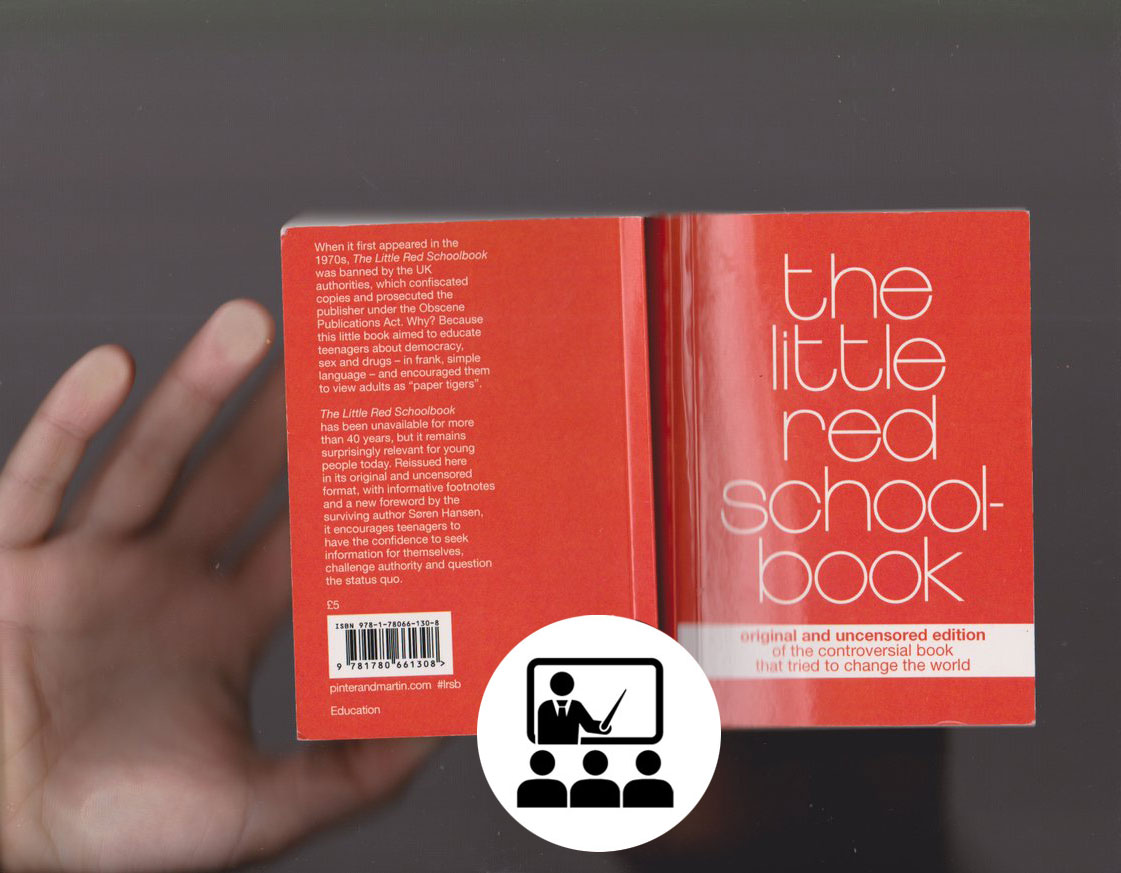
The Little Red Schoolbook: The challenging bits on education
Controversial advice from the schoolchildren’s book on education
BOOK: THE LITTLE RED SCHOOLBOOK
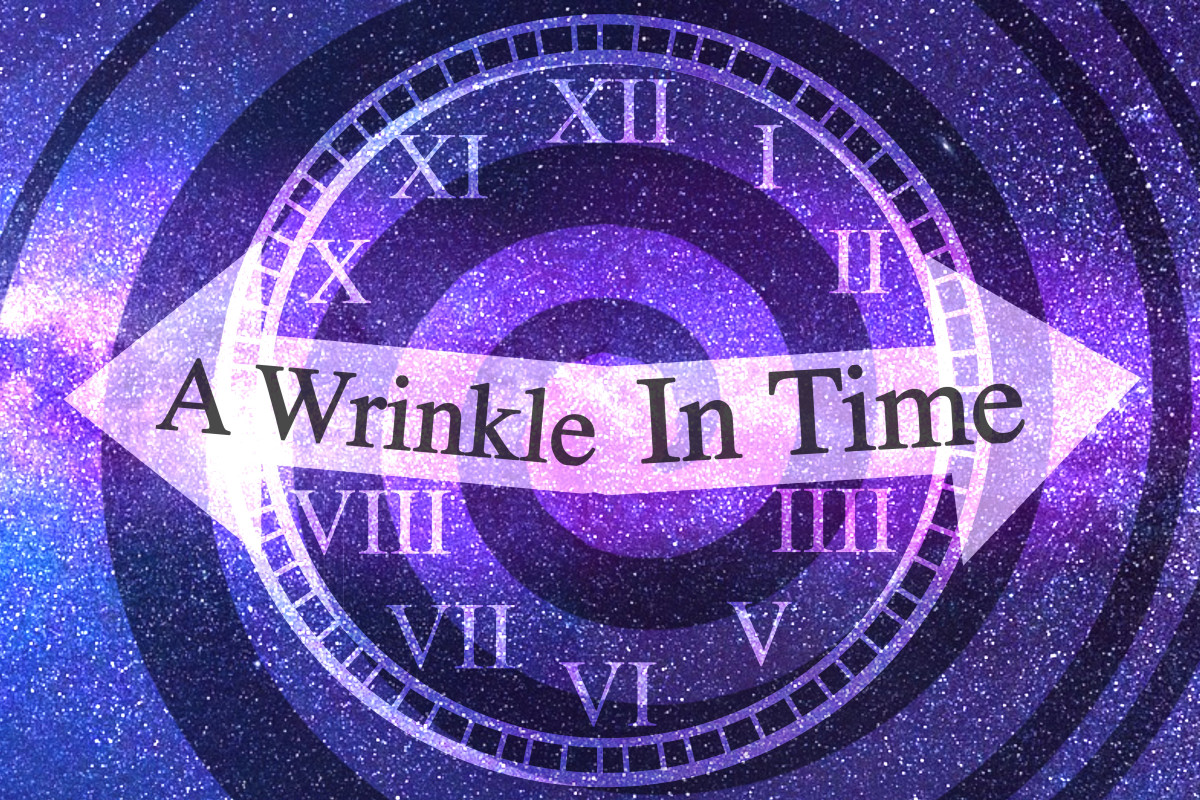
A Wrinkle in Time: Is it blasphemous or too Christian?
Two reasons Madeleine L’Engle’s book was challenged by religious conservatives
BOOK: A WRINKLE IN TIME
Endnotes

